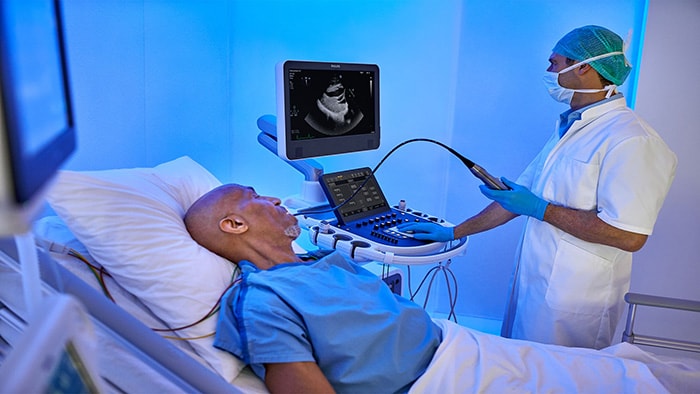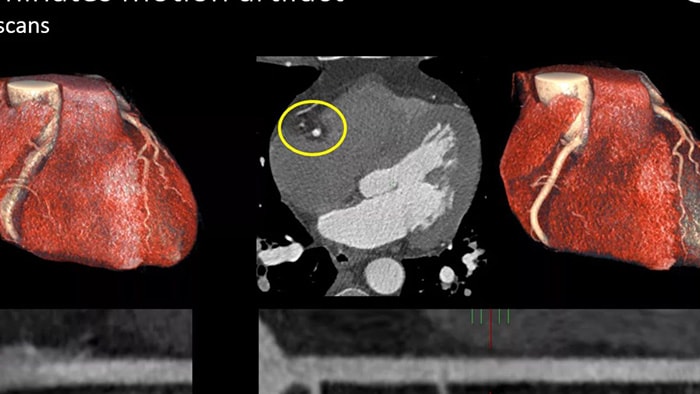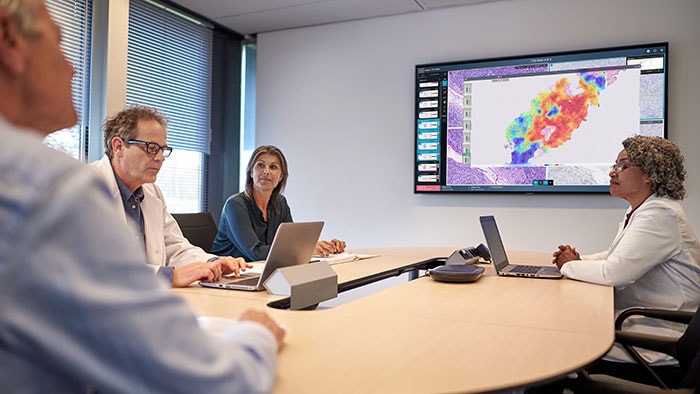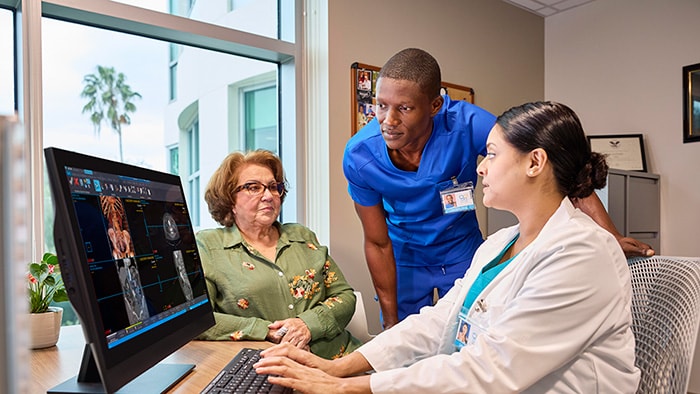Philips showcases AI-enabled integrated solutions at #ESCCongress to deliver better cardiac care to more people
Latest AI applications drive productivity and efficiency to address the biggest challenges facing cardiology leaders worldwide, transforming the diagnosis and treatment of heart disease
Aug 28, 2024 | 4 minute read
Amsterdam the Netherlands – At the European Society of Cardiology 2024 Congress, Royal Philips (NYSE: PHG, AEX: PHIA), a global leader in health technology, will demonstrate how the company is uniquely positioned to integrate imaging, devices, software and informatics to provide timely and precise information for addressing diagnostic and interventional cardiology, bringing better cardiac care to more people.
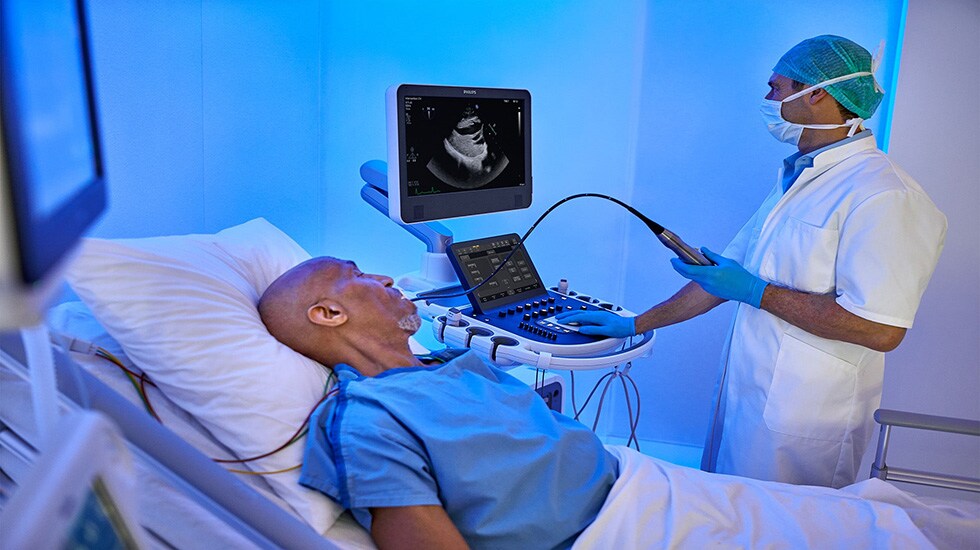
In the Philips Future Health Index (FHI) 2024 Global Report – the largest global survey of its kind, featuring insights from nearly 3,000 healthcare leaders across 14 countries – 75% of cardiology leaders report that staff shortages are negatively impacting patient care within their organizations. Adding to the challenge is the global shortage of healthcare professionals. To address these challenges, cardiology leaders are increasingly turning to AI (artificial intelligence), remote patient monitoring, virtual care, and automation as viable solutions.
“With the growing volume and complexity of patient cases and pressures to improve departmental efficiency, the demands on cardiology departments have never been higher. As the 2024 FHI data shows, cardiology leaders are quickly realizing the potential of AI, with 40% saying their organizations plan to invest in generative AI in the next 12 months,” said Dr. Atul Gupta, Chief Medical Officer of Diagnosis and Treatment at Philips. “By leveraging AI across our advanced technology portfolios in Diagnosis & Treatment, Enterprise Informatics, and Patient Monitoring, our integrated solutions can help solve cardiology’s daily challenges.”
AI at the forefront of structural heart disease diagnosis and treatment
At ESC 2024, Philips will spotlight the next dimension in echocardiography leveraging first-to-market AI-based capabilities that help accelerate and automate diagnosis of echocardiography measurements. This advanced platform features innovative AI tools designed to support the diagnosis of structural heart disease (SHD), including a new automated 3D tricuspid valve quantification tool [1], and new 3D color flow quantification to assist in diagnosing mitral regurgitation. Also featured is Philips’ real-time 3D Intracardiac Echocardiography (ICE) Catheter – VeriSight Pro – designed to give physicians more confidence and control during a variety of minimally invasive procedures in SHD and electrophysiology. Additionally, Philips EchoNavigator, integrated with the Philips Azurion Image-Guided Therapy System, assists heart teams in treating complex SHD conditions, such as heart valve repair or replacement with increased ease and efficiency.
Putting heart into cancer survivorship with new AI apps to address cardiotoxicity
While current cancer treatments such as radiation therapy and chemotherapy may improve recovery outcomes for patients and keep negative side effects to a minimum, they can also carry an increased risk of heart disease. Studies show that adult survivors of breast, prostate, lung, colorectal, hematopoietic and lymphatic cancers face a 37% higher risk of developing cardiovascular disease (CVD), with nearly half ultimately succumbing to it [2][3]. Survivors of the most common childhood cancers also face an excess risk of late mortality compared to the general population [4].
With these latest AI applications from Philips that automate and accelerate echocardiographic measurements—including the Auto Segmental Wall Motion Scoring and AutoStrain tools – we can quickly detect subtle warning signs of cardiotoxicity earlier in the treatment process.
“With these latest AI applications from Philips that automate and accelerate echocardiographic measurements—including the Auto Segmental Wall Motion Scoring and AutoStrain tools – we can quickly detect subtle warning signs of cardiotoxicity earlier in the treatment process. The improved reproducibility and shortened study times make the process more efficient and reliable, reducing the risk of treatment delays and avoiding unnecessary repetitions of studies. If signs of cardiotoxicity are detected, we can work with the patient’s care team to continue cancer treatment and prevent symptomatic or irreversible cardiotoxicity,” said Dr. Teresa Lopez, cardiologist and Co-Chair of Cardio-Oncology Guidelines at La Paz University Hospital, Madrid, Spain.
Next generation cardiovascular ultrasound enhanced with cardiology informatics
Making its debut at ESC 2024 is Philips’ latest AI-enabled cardiovascular ultrasound platform featuring industry-first applications designed to accelerate cardiac ultrasound analysis with proven technology. Now integrated with Philips Ultrasound Workspace, this platform enables the same, supporting consistent diagnostic capabilities on and off-cart, allowing for advanced analysis of vendor-agnostic data to enhance confident decision-making throughout the cardiology care path. Launched earlier this year and also making its debut is Philips’ new mini ultrasound transducer X11 4t, fully compatible with the company’s EPIQ CVx ultrasound system. As one of the most versatile mini-TEE transducers in the industry, it expands access to care for more patients, including the smallest undergoing complex intracardiac procedures like valve repairs.
Cardiac MR and CT drive increased productivity to help improve patient care
Philips AI-enabled Spectral CT 7500 offers advanced cardiac imaging with low-dose technology and a reduction in time to diagnosis [5]. Additionally, Philips CT 5300 features cutting-edge AI applications to increase productivity in diagnosis, interventional procedures, and screening, and meets the advanced diagnostic imaging requirements for cardiac care patient guidelines.
Rapidly identifying asymptomatic patients at risk of heart failure with sustainable MR
By combining Philips’ latest advances in MRI with MyoStrain (by Myocardial Solutions), early and subtle changes in heart function can be directly measured, enabling the early detection of heart failure across 48 segments of the heart [6] in 10 minutes, with less than 5 minutes of analysis time [7] to help identify regional dysfunction before it impacts the entire heart. Philips MRI innovation also features the revolutionary BlueSeal magnet technology, which has become the preferred choice for enhanced diagnostic capabilities. Since 2018, Philips has pioneered helium-free MR operations worldwide, improving access to better care for more people while saving approximately 1.9 million liters of liquid helium to date.
For more information, join Philips at ESC 2024 in Booth #G200.
Sources [1] 510(k) Pending, not available for sale in the U.S.A.
[2] Florido, R, Daya, N, Ndumele, et al. Cardiovascular Disease Risk among Cancer Survivors, Journal of American College of Cardiology, 2022. Results in other cases may vary. https://www.jacc.org/doi/10.1016/j.jacc.2022.04.042
[3] Cancer patients are at higher risk of dying from heart disease and stroke, European Society of Cardiology, 2019.
[4] Dixon et al, Lancet 2023. Ehrhardt et al., Nature Reviews Clinical Oncology, 2023.
[5] Economic impact of IQon for patients with renal insufficiency. White paper. Philips.
[6] Compared to Philips belt-based signal. Requires an unobstructed line of sight.
[7] Precise Image for cardiac scans is 510(k) pending –not available for sale in the USA. © Myocardial Solutions, Inc. 2020. All rights reserved.
